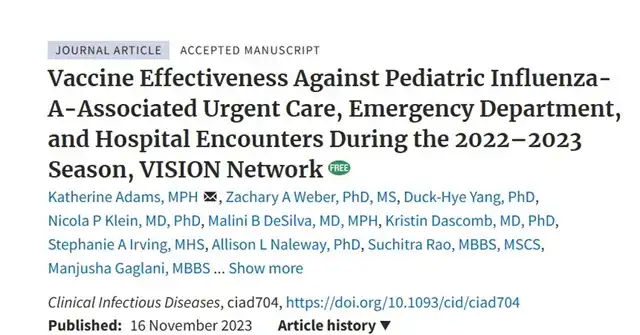CDC Study: Effectiveness of Last Year’s Influenza Vaccine Still Below 50%
- Normal Liver Cells Found to Promote Cancer Metastasis to the Liver
- Nearly 80% Complete Remission: Breakthrough in ADC Anti-Tumor Treatment
- Vaccination Against Common Diseases May Prevent Dementia!
- New Alzheimer’s Disease (AD) Diagnosis and Staging Criteria
- Breakthrough in Alzheimer’s Disease: New Nasal Spray Halts Cognitive Decline by Targeting Toxic Protein
- Can the Tap Water at the Paris Olympics be Drunk Directly?
CDC Study: Effectiveness of Last Year’s Influenza Vaccine Still Below 50%
- Should China be held legally responsible for the US’s $18 trillion COVID losses?
- CT Radiation Exposure Linked to Blood Cancer in Children and Adolescents
- FDA has mandated a top-level black box warning for all marketed CAR-T therapies
- Can people with high blood pressure eat peanuts?
- What is the difference between dopamine and dobutamine?
- How long can the patient live after heart stent surgery?
CDC Study: Effectiveness of Last Year’s Influenza Vaccine Still Below 50%
A study funded by the Centers for Disease Control and Prevention (CDC) reveals that during the 2022-2023 flu season, the effectiveness of the influenza vaccine in preventing children and adolescents from requiring emergency care and hospitalization is less than 50%.
Published recently in the journal “Clinical Infectious Diseases,” the research found that the overall effectiveness of seasonal flu vaccines in reducing emergency visits and urgent care due to influenza viruses is only 48%, with effectiveness in preventing hospitalization at 40%.
Researchers analyzed data from 55 hospitals and 107 emergency sites across multiple states in the United States, conducting type A influenza testing on children and adolescents aged 6 months to 17 years from October 2022 to March 2023.

Influenza viruses are elusive, highly diverse, and rapidly mutating, maintaining a pace that challenges the development of new vaccines each year in the ongoing race against the human immune system. One of the primary goals of vaccines is to inhibit the hemagglutinin protein that helps influenza viruses adhere to human cells. Unfortunately, this protein possesses strong mutation capabilities, evading vaccine attacks.
The study indicates vaccine effectiveness ranging from 44% to 52%, with an overall effectiveness of 48%. Effectiveness for children aged 6 months to 4 years is between 47% and 58%, while for adolescents aged 9 to 17, it ranges from 30% to 45%.
Despite the relatively modest efficacy of the vaccine, researchers emphasize that the influenza vaccine remains a “critical tool in preventing severe influenza illness among children and adolescents.”
According to the CDC, the agency conducts annual research during the flu season to help determine vaccine effectiveness. Vaccine effectiveness studies contribute to evaluating the “value of influenza vaccines as a public health intervention.” Although negative detection design is a common method for determining vaccine efficacy, a 2021 study from the U.S. Department of Health and Human Services cautioned about the need to be “particularly careful” when using this method to assess whether vaccination reduces the severity of breakthrough infections.
In describing breakthrough infections, U.S. regulatory agencies use language similar to that used for COVID-19 vaccines. U.S. health officials acknowledge that receiving the vaccine does not prevent the spread of COVID-19 or other viruses to others, and the efficacy of vaccines is redefined in terms of preventing hospitalization and death.
Statistical data reveals that the effectiveness of the influenza vaccine during the 2022-2023 flu season is 48%, compared to 36% during the 2021-2022 flu season. Over the past decade, influenza vaccine effectiveness has fluctuated between 19% and 52%.
CDC Study: Effectiveness of Last Year’s Influenza Vaccine Still Below 50%
(source:internet, reference only)
Disclaimer of medicaltrend.org
Important Note: The information provided is for informational purposes only and should not be considered as medical advice.



